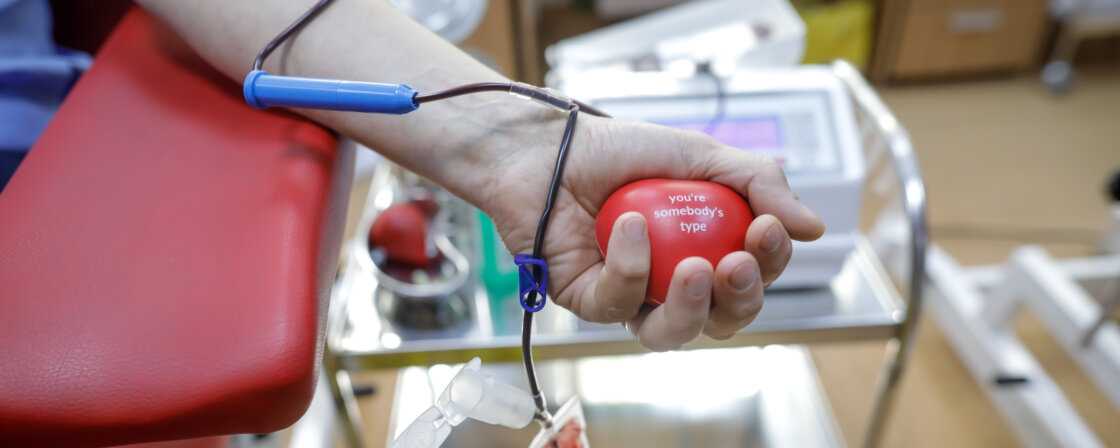In this article, we’ll look at what exactly the first visit to the clinic entails, what the intervals and limits are for blood and plasma, and how it all works from a tax perspective. We’ll show you what line to fill in on your tax return for blood donations, when the deduction belongs on your employer’s annual tax return, and how self-employed people do it. We’ll also describe the entitlement to time off work in more detail: when it is automatic, when it is not, what exactly the receipt from the donation site must contain, and why it is a matter of practice whether it was a gratuitous donation or a donation of plasma for payment.
Who can donate blood and how often
Donation takes place in hospital blood transfusion departments and licensed centres. In the Czech Republic, a healthy person aged 18-65 years (first-time donors usually under 60) and weighing at least 50 kg can become a blood donor – eligibility is assessed by a doctor on site. The intervals between whole blood donations are usually 10-12 weeks (women usually three times a year, men four times a year).
Plasma can be donated more frequently in good health – the usual minimum interval is 14 days. Specific limits are always set by the specialist unit. The plasmapheresis (plasma collection) itself takes about 40-60 minutes and the volume collected is based on your weight.
What the first blood collection involves
First-time donors can make an appointment online/by telephone at most centres, and some hospitals will accept first-time donors without an appointment on specified days. When you arrive, you will be registered, present your ID and health insurance card.
Allow extra time for first collections: blood usually takes 60-120 minutes in total, for instrumental collections (plasma) allow about 90-150 minutes (in some hospitals the first visit may take longer depending on the traffic).
Are you solving a similar problem?
Tax legal advice
Not sure how to do your taxes correctly so you don’t get it wrong? We can help you navigate the law, whether it’s dealing with a specific tax situation, preparing for an audit by the tax authority or defending yourself in court.
I want to help
- When you order, you know what you will get and how much it will cost.
- We handle everything online or in person at one of our 6 offices.
- We handle 8 out of 10 requests within 2 working days.
- We have specialists for every field of law.
Blood donor questionnaire
Before donation, you will fill out a donor questionnaire. This asks about your current health, medications taken, surgeries undergone, travel abroad, risky contacts and behaviour (to protect recipients), and also advises you of the option of ‘discreet self-exclusion’ (where you can anonymously request that your donated blood not be used).
You will sign the questionnaire including consent to laboratory testing incl. HIV, HBV, HCV and syphilis. It usually takes 10-15 minutes to complete.
Short orientation examination and interview with a doctor
This is followed by a blood draw for blood count/haemoglobin, blood pressure and pulse measurement and an interview with the doctor to discuss your medical history and any uncertainties from the questionnaire. The doctor decides on your eligibility for the collection and may recommend a deferral (e.g. after certain procedures, travel or infections).
The collection itself
Blood is drawn 450 ml from a disposable sterile kit. The actual collection usually takes 8-12 minutes (excluding time for registration, examination and rest).
For plasma collection, the process is slightly more demanding. This is because the blood is circulated through a separator that separates the plasma and returns the rest (red blood cells, platelets). The collection time is approximately 40-90 minutes. Between 650 and 850 ml of plasma is collected per separation, depending on the weight.
Rest and refreshment
After the collection , you will rest for 10-20 minutes, receive fluids and light refreshments. The staff will instruct you on what to do for the rest of the day (drink more, avoid more physical activity, sauna and alcohol, ideally no smoking). Some centres recommend drinking 2-3 litres the day before and at least 0.5 litres of fluids on the day of collection, and having a light, non-fat breakfast. Fatty foods can devalue the plasma, which cannot be given to patients.
Blood donation and tax: tax deduction
As an individual, you will receive a tax deduction of CZK 3,000 for each free donation of blood or blood components (including plasma). The donation of hematopoietic cells and the removal of an organ from a living donor is valued at CZK 20 000 for tax purposes. This is not a tax discount, but a tax-free part of the tax base – a deduction that reduces the base on which the tax is newly calculated.
Non-taxable parts are items that you deduct from the tax base, i.e. before you even calculate the tax itself. By reducing your basis, you save a percentage of your tax rate. In contrast, a tax credit deducts only from your calculated tax.
How much tax will this save in real terms
Because it’s a deduction, it depends on your tax rate. In 2025, income is taxed at two rates – 15% (the base up to the statutory limit) and 23% (the part of the base above the limit equal to 36 times the average wage).
For 2025, the government has set the average wage at CZK 46,557, so the 23% threshold works out at CZK 1,676,052 (calculated as: CZK 46,557 × 36). So, in practice, one withdrawal of CZK 3,000 will reduce your tax by CZK 450 ( if you are in the 15% band) or CZK 690 ( if you have part of your basis above the limit and “save” for 23%).
Blood donation limits
- Minimum for claiming donations: in aggregate either ≥ CZK 1,000 or at least 2% of your tax base (you just need to meet one of the conditions). For blood donors, the limit is met with just one donation (CZK 3,000).
- Maximum for 2022-2026: thanks to an exceptional modification, individuals can deduct donations up to 30% of their tax base (previously normally 15%). This increase has been extended to 2026.
The conditions for a tax deduction for a blood donor
Since 2015, you can only claim the deduction if you have not been reimbursed in connection with the donation other than for proven travel expenses. Therefore, if you donate plasma “for a fee” at a private centre and receive financial compensation, the deduction cannot be claimed. Proved travel expenses (e.g. tickets) do not matter.
Ask for a donation receipt from the facility concerned, showing the recipient (hospital/centre), the object of the donation (blood/plasma donation), the value (for tax purposes, CZK 3,000 for blood/plasma) and the date. Keep the documents in case of inspection.
Health insurers also often provide allowances or bonuses to donors (e.g. VZP has long offered donor programmes).
Exactly how to claim the deduction: employees vs. self-employed
Employees – annual settlement with employer
If you’ re not required to file a return, you’ll ask your employer for an annual return – usually by 15 February of the following year. You enter the amount in the “Non-taxable portions – gratuitous benefits (gifts)” section of the annual return form and provide a receipt. Your employer will then take any deduction into account in your pay.
Employees – I file my own return
If you want to file your own return (or have to), you claim the gifts on line 46 ( line 25 on the short form) under ‘Non-taxable parts of the tax base’. The same rules apply when filing electronically through the MY TAXES portal. You don’t normally attach the receipt to your return, but you must have it in case the tax authorities call for it.
Self-employed – classic regime
For self-employed persons, this is also the non-taxable part of the tax base – i.e. the same line in the return as for employees. The deduction is not linked to whether you keep actual expenses or flat-rate expenses – it applies equally in both cases.
Self-employed in the flat-rate scheme (flat-rate tax)
If you are in the flat-rate scheme all year, you don’t file a tax return and you can’t claim the tax-free parts (including gifts). If you would like to take the deduction, you must be out of the flat-rate scheme or out of it for the following year.
Tip for article
Have you filed the wrong tax return? Find out how to correct it in our next article.
Blood donation – a line on your tax return
For the personal income tax return, write donations on line 46 (line 25 in the short version). For the employer’s annual return, add donations to the ‘Non-taxable parts – gratuitous benefits’ section.
Each year the Inland Revenue publishes an up-to-date model Annual Return Application and the deadline by which it can be requested. Electronic filing of returns and forms can be found in the MY TAXES application.
How much you will save: model calculations
Employee, 3 blood draws (free of charge)
Employee has 3 free blood draws during the year, each for CZK 3,000 → total deduction of CZK 9,000. His taxable salary puts him in the 15% rate. Tax saving: 9 000 × 15% = CZK 1 350. He claims the deduction in his annual tax return.
Self-employed (outside the flat-rate scheme), 10 plasma collections (free of charge)
A self-employed person (taxable amount CZK 400,000) donates 10 times plasma to a teaching hospital (free of charge) → CZK 30,000 deduction. The limit of 30% of the taxable amount is CZK 120,000, so he can easily fit into it. At the 15% rate, he saves CZK 4,500(30,000 × 15%). He claims it on his tax return on line 46.
Plasma for remuneration in a private centre
The donor receives a financial reward for each donation. He does not claim a deduction because the gift was not gratuitous (only proven travel expenses are admissible). It is also not an impediment to work in the general interest, so he is not entitled to paid time off.
High earner in the 23 % band
Employee with part of the basis in the 23% band donates 4 times blood → CZK 12 000 deduction. Tax saving corresponds to 23%: 12 000 × 23% = CZK 2 760.
Are you solving a similar problem?
Tax legal advice
Not sure how to do your taxes correctly so you don’t get it wrong? We can help you navigate the law, whether it’s dealing with a specific tax situation, preparing for an audit by the tax authority or defending yourself in court.
I want to help
- When you order, you know what you will get and how much it will cost.
- We handle everything online or in person at one of our 6 offices.
- We handle 8 out of 10 requests within 2 working days.
- We have specialists for every field of law.
Entitlement to time off for plasma and blood donation
Donating blood and plasma is a so-called “other act in the general interest” under the Labour Code. This means that if the journey to the donation, the donation itself, the journey back and the necessary recovery interfere with your working time, your employer must release you and pay you wage/salary compensation equal to your average earnings.
The law operates with a 24-hour time frame from the start of the journey to collection – if 24 hours is not enough time to travel and collect, then the additional time shown to be necessary (if it still interferes with working time) is also reimbursed.
For the donation of other biological material (e.g. bone marrow), the time frame is wider – up to 48 hours, and the physician can reduce/extend the time up to 96 hours depending on the medical condition and nature of the donation.
If the donation does not happen in the end (e.g. due to test results), you are only entitled to the necessary time as proven by confirmation (travel + examination).
Example. The time protected by law runs until 8:00 a.m. on Saturday. If the Friday shift runs 9-5, you don’t work all day Friday and you will be compensated for wages because the travel-collection-recovery interfered with your work hours.
When can an employer refuse time off
The right to paid time off is tied to the interference with work hours and the inability to perform the task outside of work. The interpretation of practice is fairly uniform on this: in principle, it is to be donated outside the shift. As long as it is objectively possible (opening hours, your shift schedule, available deadlines), it is not an interference with work and the employer can require you to go outside working hours. Conversely, it cannot arbitrarily “cut” the time off (e.g. to only 4 hours).
Example:
- Scenario A: You have a “short/long week” shift and the donor center takes donors on days you do not have a shift. Your employer may insist that you use your days off.
- Scenario B: You work every weekday from nine to five and the centre only takes donations on weekday mornings. You are entitled to time off with pay because it cannot be arranged otherwise.
Do I have to have the time off arranged in advance? Yes – give notice and proof
The general rules apply to work restrictions: you are obliged to ask well in advance (as soon as you know the date) and to prove the restriction. Typically, you will present a confirmation from the pick-up location with the date and type of pick-up. You are not entitled without proof.
So what to make sure you do:
- Confirmation of the blood or plasmadonation (date, type: whole blood/plasma – apheresis; stamp or time),
- if applicable, confirmation of incomplete donation (for payment of the necessary time),
- and, if timing against shifts is being addressed, proof of appointment (e.g. email/reservation).
Paid plasma vs. gratuitous donation
In recent years, there has been a growing trend towards ‘donation’ of plasma for payment by private operators. In this case, you are not entitled to time off or a tax deduction. It is not a gratuitous donation. But how do you know when it is a gift and when it is not?
Gift = gratuitous receipt. You will not receive any remuneration apart from the proven travel costs (travel, etc.). You can then claim a deduction of CZK 3,000 for the receipt (the tax-free part of the tax base) and at the same time (if it affects working hours) you are entitled to paid time off.
NOT A DONATION = Paid Plasma. Once you receive a monetary reward (typically 700-1,000 CZK for a subscription), it is not a gratuitous benefit, so the 3,000 CZK/subscription deduction cannot be claimed. Instead, the amounts paid are your income (other income) and will be taxed on your tax return (unless it is exempt casual income).
Summary
A healthy person aged 18-65 (min. 50 kg) can donate blood/plasma in the Czech Republic; blood can be donated approximately 3 times a year by women/4 times a year by men, plasma usually after 14 days. For each gratuitous donation of blood or plasma, an individual can claim a deduction from the tax base of CZK 3,000 (hematopoietic cells/organ CZK 20,000). This is a non-taxable part of the tax base, so the real saving corresponds to the tax rate: usually 15% (CZK 450 per collection) or 23% (CZK 690). There is a lower limit for donations (minimum CZK 1,000 or 2% of the base) and a temporarily increased ceiling of 30% of the base (2022-2026). Deduction is only available if you do not receive reimbursement other than for proven travel expenses; request and keep the receipt. Employees report donations on the annual return (or on the return on line 46 / abbreviated on line 25 – self-employed anyway); those who are on a flat rate scheme all year cannot claim the deduction.
Blood/plasma donation is an “other act of general interest” – if it interferes with working hours and cannot realistically be arranged off-shift, the employee is entitled to time off and wage reimbursement (typically within 24 hours of the start of travel for the donation; for other biological material, up to 48-96 hours depending on the doctor). Entitlement must be notified and documented in advance (confirmation of collection/arranged time; for incomplete collection, only the necessary time). The employer may request collection outside working hours if objectively possible. Paid plasma at a private center is not a gift: it does not qualify for a deduction or paid time off, and the amounts paid are taxed as your income.
Frequently Asked Questions
Is "blood donation tax credit" the correct term?
It has been used, but it is precisely a “gratuitous transaction – deduction from the tax base” (i.e. the tax-free part), not a tax credit. Practical difference: a deduction reduces the tax base, a rebate reduces the calculated tax.
Blood donations and taxes - can I combine them with other donations?
Yes, you can combine e.g. blood donations with monetary donations for health, education, etc. But there is a common limit (up to 30% of the base for individuals for 2022-2026) and a minimum (≥ CZK 1,000 or 2%).
Plasma donation and taxes - how many times a year can I claim?
From a tax point of view, there is no limit on the number of withdrawals, only the annual limit of % of your basis and the non-refundability are respected. The medical limits (frequency and volume) are set by the transfusion service.
What are the rules for blood donation by students and self-employed people?
The rules for deduction are the same – whether you file a tax return (a student with an income typically doesn’t, a self-employed person does) and whether it is a gratuitous purchase. The self-employed in the flat-rate scheme do not claim the deduction.
Agreements (FTEs): is the time off paid?
As of 1 October 2023, contract workers are also entitled to time off work for public interest obstacles (i.e. including blood/plasma donations), but without pay compensation, unless payment is expressly agreed in the agreement or internal regulations.




